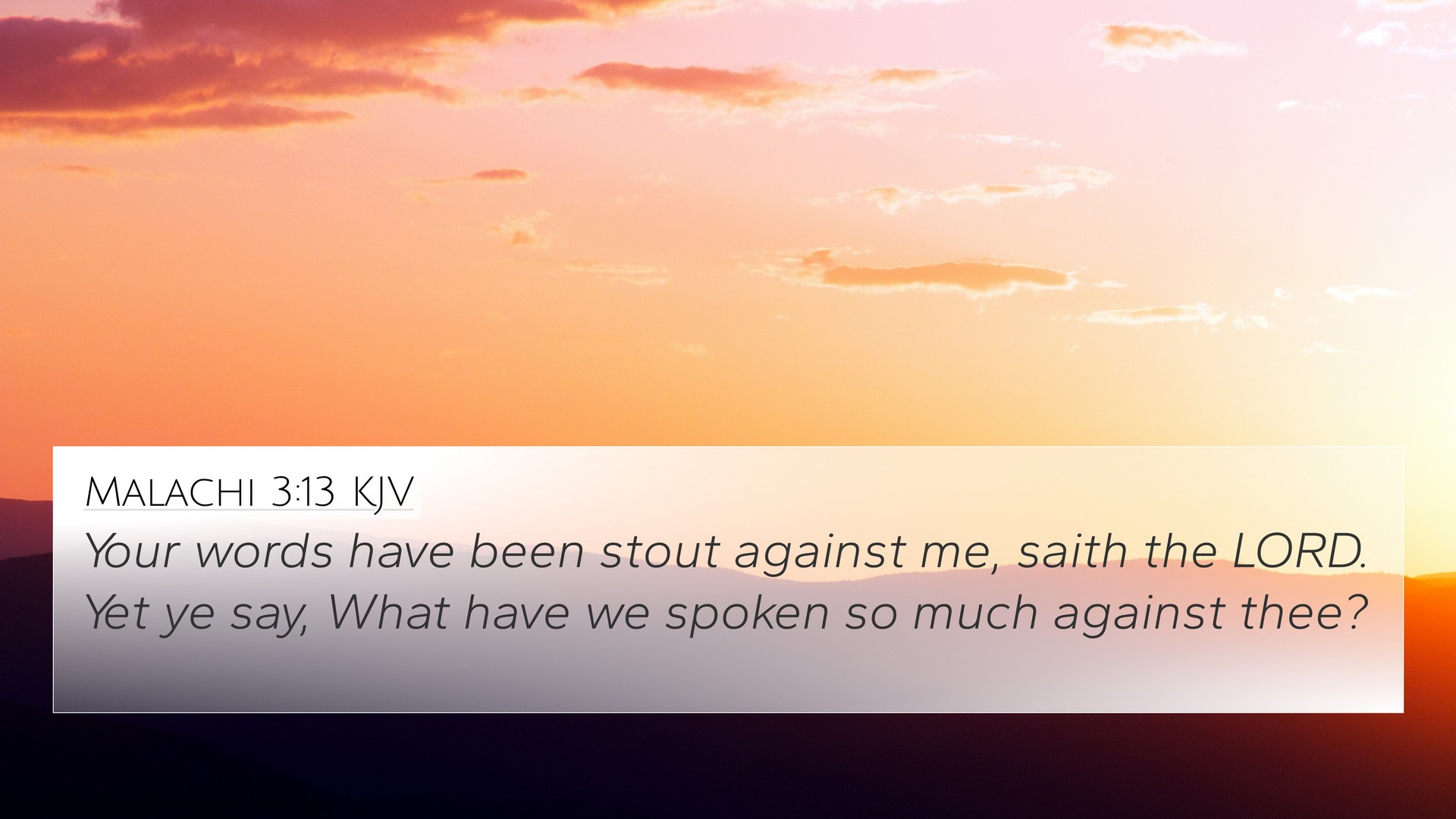Old Testament
Genesis Exodus Leviticus Numbers Deuteronomy Joshua Judges Ruth 1 Samuel 2 Samuel 1 Kings 2 Kings 1 Chronicles 2 Chronicles Ezra Nehemiah Esther Job Psalms Proverbs Ecclesiastes Song of Solomon Isaiah Jeremiah Lamentations Ezekiel Daniel Hosea Joel Amos Obadiah Jonah Micah Nahum Habakkuk Zephaniah Haggai Zechariah MalachiMalachi 3:13 Similar Verses
Malachi 3:13 Cross References
Your words have been stout against me, saith the LORD. Yet ye say, What have we spoken so much against thee?
Uncover the Rich Themes and Topics of This Bible Verse
Listed below are the Bible themes associated with Malachi 3:13. We invite you to explore each theme to gain deeper insights into the Scriptures.
Malachi 3:13 Cross Reference Verses
This section features a detailed cross-reference designed to enrich your understanding of the Scriptures. Below, you will find carefully selected verses that echo the themes and teachings related to Malachi 3:13 KJV. Click on any image to explore detailed analyses of related Bible verses and uncover deeper theological insights.
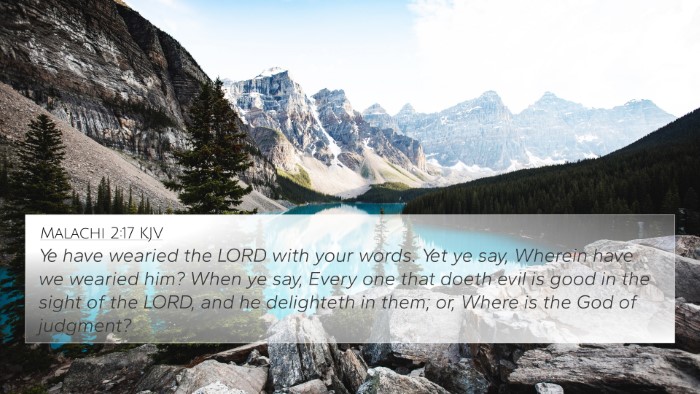
Malachi 2:17 (KJV) »
Ye have wearied the LORD with your words. Yet ye say, Wherein have we wearied him? When ye say, Every one that doeth evil is good in the sight of the LORD, and he delighteth in them; or, Where is the God of judgment?
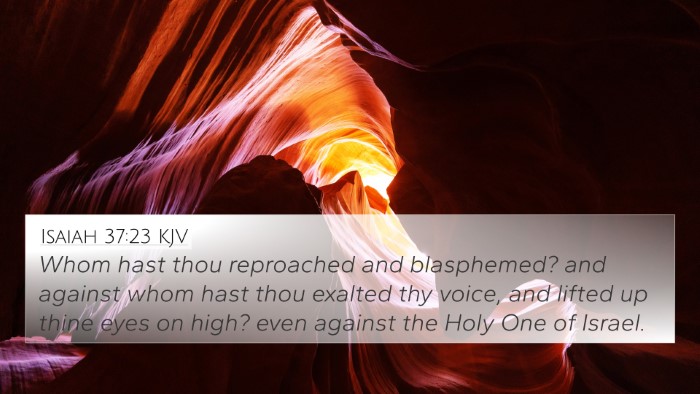
Isaiah 37:23 (KJV) »
Whom hast thou reproached and blasphemed? and against whom hast thou exalted thy voice, and lifted up thine eyes on high? even against the Holy One of Israel.

Romans 9:20 (KJV) »
Nay but, O man, who art thou that repliest against God? Shall the thing formed say to him that formed it, Why hast thou made me thus?

Malachi 1:6 (KJV) »
A son honoureth his father, and a servant his master: if then I be a father, where is mine honour? and if I be a master, where is my fear? saith the LORD of hosts unto you, O priests, that despise my name. And ye say, Wherein have we despised thy name?
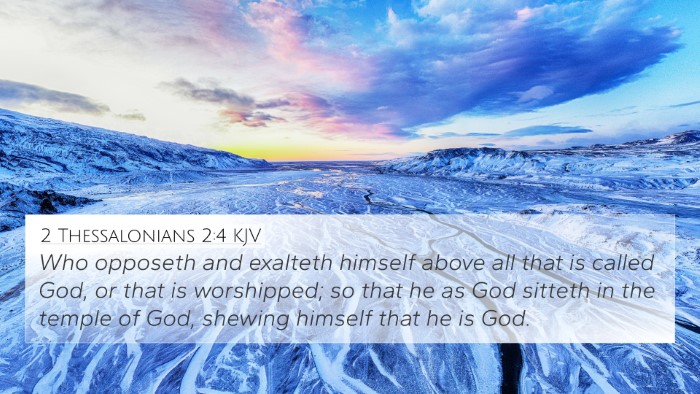
2 Thessalonians 2:4 (KJV) »
Who opposeth and exalteth himself above all that is called God, or that is worshipped; so that he as God sitteth in the temple of God, shewing himself that he is God.

Exodus 5:2 (KJV) »
And Pharaoh said, Who is the LORD, that I should obey his voice to let Israel go? I know not the LORD, neither will I let Israel go.

2 Chronicles 32:14 (KJV) »
Who was there among all the gods of those nations that my fathers utterly destroyed, that could deliver his people out of mine hand, that your God should be able to deliver you out of mine hand?

Malachi 2:14 (KJV) »
Yet ye say, Wherefore? Because the LORD hath been witness between thee and the wife of thy youth, against whom thou hast dealt treacherously: yet is she thy companion, and the wife of thy covenant.

Job 40:8 (KJV) »
Wilt thou also disannul my judgment? wilt thou condemn me, that thou mayest be righteous?

Jeremiah 8:12 (KJV) »
Were they ashamed when they had committed abomination? nay, they were not at all ashamed, neither could they blush: therefore shall they fall among them that fall: in the time of their visitation they shall be cast down, saith the LORD.

Malachi 3:8 (KJV) »
Will a man rob God? Yet ye have robbed me. But ye say, Wherein have we robbed thee? In tithes and offerings.

Psalms 10:11 (KJV) »
He hath said in his heart, God hath forgotten: he hideth his face; he will never see it.
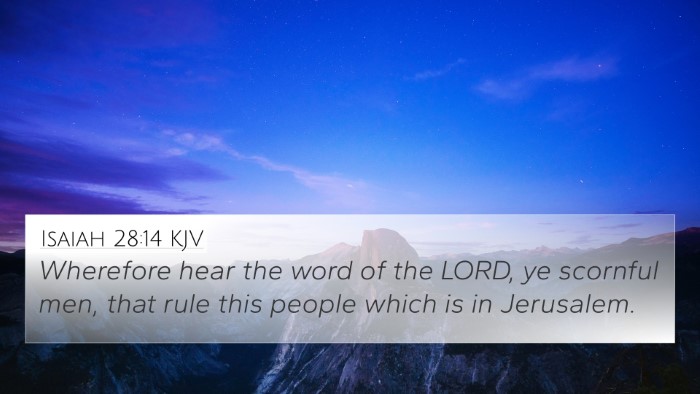
Isaiah 28:14 (KJV) »
Wherefore hear the word of the LORD, ye scornful men, that rule this people which is in Jerusalem.

Isaiah 5:19 (KJV) »
That say, Let him make speed, and hasten his work, that we may see it: and let the counsel of the Holy One of Israel draw nigh and come, that we may know it!
Malachi 3:13 Verse Analysis and Similar Verses
Understanding Malachi 3:13
Malachi 3:13 states, "Your words have been hard against me, says the Lord. But you say, 'How have we spoken against you?'" This verse highlights the tension between God and His people regarding their attitudes and words.
Verse Context
In the broader context of Malachi, God addresses the spiritual apathy and disobedience of Israel. The words spoken against God reflect a deeper issue of their covenant relationship. In this verse, they are either unaware of their transgressions or are in denial about them.
Commentaries Insights
- Matthew Henry: Henry emphasizes the significance of the people's accusations and how they questioned God’s justice. He notes that the phrase, "Your words have been hard against me," indicates their rebellious spirit and dissatisfaction with God's ways.
- Albert Barnes: Barnes points out that this verse reveals the ignorance of Israel regarding their own words and actions. He highlights their complaint about God and how they fail to recognize the seriousness of their contempt toward Him.
- Adam Clarke: Clarke provides insights into the nature of their argument with God. He explains how they challenge God's determination and express confusion regarding the consequences of their words, showing a lack of reverence and understanding of the divine will.
Cross-Referencing Biblical Texts
To gain a deeper understanding of Malachi 3:13, it's essential to explore its connections with other scriptures:
- Job 7:20: Job expresses frustration towards God, asking why he is being scrutinized, paralleling the sentiments in Malachi.
- Psalms 139:4: This verse affirms that God knows our words even before they are spoken, underlining the seriousness of our speech towards Him.
- Isaiah 29:13: The Lord speaks against those who draw near with their lips while their hearts are far from Him, resonating with Israel’s empty expressions in Malachi.
- Proverbs 18:21: This scripture reminds us of the power of the tongue, signifying how our words can impact our relationship with God.
- James 3:9: Here, the Apostle discusses the duality of the tongue that praises God and curses people, akin to the accusations found in Malachi.
- Matthew 12:36-37: Jesus teaches that we will give an account for our words, reinforcing the idea of responsibility in what we say, paralleling Israel’s accountability in Malachi.
- Hebrews 3:15: It warns against hardening our hearts, much like the attitude shown by Israel in Malachi concerning God's commands.
Thematic Connections
Malachi 3:13 reveals crucial themes about:
- Covenant Relationship: God's frustrations with His people's disobedience and their response exemplify the ongoing struggle in the covenant relationship.
- Spiritual Apathy: The apathy depicted by the Israelites highlights a broader message about the need for genuine engagement in our faith.
- Accountability for Speech: The importance of recognizing that our words hold weight in our relationship with God.
Conclusion
Malachi 3:13 serves as a powerful reminder of the importance of our words and attitudes towards God. Through the lens of the provided commentaries, we can better understand the historical and spiritual context of this verse. The cross-references enrich our study by revealing connections between various Biblical texts, illustrating the continuity of God’s message throughout the scriptures. In engaging with this verse, one can reflect on their own words and attitudes, fostering a renewed commitment to honoring God through both speech and deed.
Further Resources for Study
For those seeking deeper insight into biblical texts and themes, consider utilizing tools for Bible cross-referencing, such as:
- Bible concordance to enhance word studies.
- Bible cross-reference guide for thematic analyses.
- Cross-reference Bible study methods to explore connections.
- Bible reference resources to support sermon preparations or personal study.
